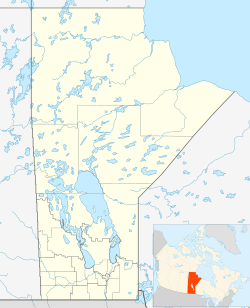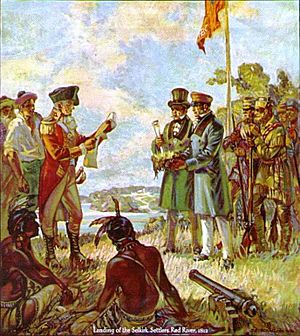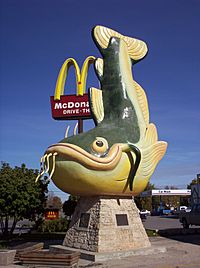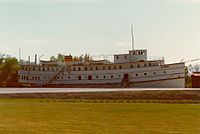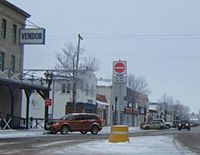Selkirk, Manitoba facts for kids
Quick facts for kids
Selkirk
|
|
|---|---|
|
City
|
|
| City of Selkirk | |
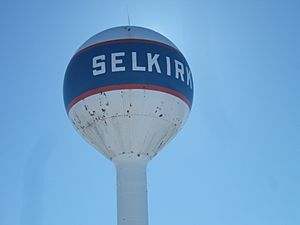
Selkirk water tower
|
|
| Nickname(s):
Catfish Capital of the World
|
|
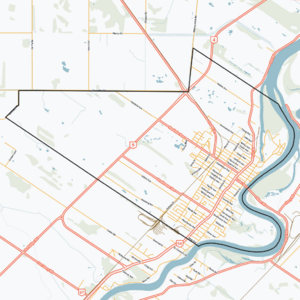
City boundaries
|
|
| Country | Canada |
| Province | Manitoba |
| Region | Interlake and Winnipeg Capital |
| Settled | 1813 |
| Town | June 5, 1882 |
| City | 1998 |
| Named for | Thomas Douglas, 5th Earl of Selkirk |
| Area | |
| • City | 24.47 km2 (9.45 sq mi) |
| Elevation | 225 m (738 ft) |
| Population
(2021 Census)
|
|
| • City | 10,504 (7th) |
| • Urban | 9,761 |
| • Urban density | 429.3/km2 (429/sq mi) |
| Time zone | UTC−6 (CST) |
| • Summer (DST) | UTC−5 (CDT) |
| Forward sortation area |
R1A
|
| Area code(s) | Area codes 204 and 431 |
Selkirk is a city in the Canadian province of Manitoba. It is located on the Red River, about 22 kilometers northeast of Winnipeg. Winnipeg is the capital city of Manitoba. In 2021, Selkirk had a population of 10,504 people.
The city's main industries are tourism, a steel mill, and a hospital that helps people with mental health. A special vertical lift bridge crosses the Red River, connecting Selkirk to the smaller town of East Selkirk. Selkirk is linked to Winnipeg by Highway 9 and has train service from the Canadian Pacific Railway.
Selkirk was named after a Scotsman called Thomas Douglas, 5th Earl of Selkirk. He was given permission to start a colony in the Red River area in 1813.
Contents
History of Selkirk
The city of Selkirk is located near the center of a large area of land. This land was bought by the Earl of Selkirk from the Hudson's Bay Company. The first settlers of the Red River Colony arrived in 1813.
The settlers made a deal with the Saulteaux Indigenous people of the area. However, two trading companies, the Hudson's Bay Company and the North West Company, were rivals. This led to fights between the settlers and the trading companies. The town was named Selkirk and became an official town in 1882. This was done to honor the Earl for bringing settlers to the region.
Economy and Fun in Selkirk
Entertainment and Tourism
Selkirk is known as the Catfish Capital of the World. This is because many catfish live in the nearby Red River. This nickname was created to attract American anglers (people who fish) to catch large catfish.
Selkirk is also home to Chuck the Channel Cat. This is a large fiberglass statue of a catfish that is 25 feet long. Chuck was named after a local fisherman, Chuck Norquay. He loved fishing in the Red River and sadly drowned while doing so. The statue was built in 1986 and placed in front of Smitty's Restaurant on Main Street.
The Marine Museum of Manitoba is located in Selkirk. It has many old marine items from Lake Winnipeg and the Red River area. Selkirk also has a base for the Canadian Coast Guard.
Every year, the Selkirk Fair and Rodeo takes place. It celebrates the area's farming history. In 2008, the fair celebrated its 130th anniversary!
Jobs in Selkirk
The Selkirk Mental Health Centre is a big employer in the city. It is the largest mental health facility in Manitoba. It has a park-like area around it, located on the edge of the city.
Gerdau is a company that runs a steel mill in Selkirk. This steel mill is another major employer in the city. It is known locally as MRM or "The Manitoba Rolling Mills".
Sports in Selkirk
Selkirk has two hockey teams. The Selkirk Steelers play in the Manitoba Junior Hockey League. They play their games at the Selkirk Recreation Complex. The Selkirk Fishermen play in the Capital Region Junior Hockey League.
Selkirk has also hosted big sports events. In 2007, it hosted some games for the 2007 Women's World Ice Hockey Championships along with Winnipeg. In 2009, Selkirk hosted the 2009 Telus Cup, which is Canada's national midget hockey championship.
The Selkirk Curling Club is also in the city. It has hosted many curling events, including the Masters Grand Slam of Curling in 2014.
Geography of Selkirk
Selkirk is in the Interlake Region of Manitoba. It is about 22 kilometers northeast of Winnipeg, the provincial capital. A special vertical lift bridge crosses the Red River. This bridge connects Selkirk to the smaller town of East Selkirk.
The city mostly shares borders with the Rural Municipality of St. Andrews. To the east, it borders the Rural Municipality of St. Clements across the Red River. The land around Selkirk is very flat. You can see fields of wheat and canola surrounding the city.
Climate in Selkirk
Selkirk is on the edge of the Canadian Prairies. It gets about 510.4 millimeters of rain and snow each year. Selkirk has four very clear seasons:
- Winter: November to March
- Spring: April to May
- Summer: June to August
- Autumn: September to October
Selkirk can have very hot summers and very cold winters. The highest temperature ever recorded was 38.5 degrees Celsius in June 1995. The lowest temperature was -45.6 degrees Celsius in February 1966. Selkirk usually has snow for about 21 days each year. This happens from November to April.
Water in Selkirk
The City of Selkirk gets its water from six wells. Four wells are inside the city, and two are in the nearby R.M. of St. Andrews. These wells draw water from underground aquifers. The water is then cleaned at the Selkirk Water Treatment Plant. After cleaning, it is sent to homes and businesses through pipes.
The Selkirk Water Tower is a well-known landmark in the area. It was built in 1961. It replaced an older water tank from 1909. The current water tower can hold up to 946,000 liters of water. In March 2020, the city announced a contest to design new paint for the 130-foot tall structure.
In 2016, the City of Selkirk worked with the government to improve its water system. This project cost about C$35.2 million and included building a new water treatment plant. The improved system will be big enough to serve St. Andrews and the Lower Fort Garry Historic Park.
Population of Selkirk
| Historical population | ||
|---|---|---|
| Year | Pop. | ±% |
| 1901 | 2,188 | — |
| 1911 | 2,977 | +36.1% |
| 1921 | 3,726 | +25.2% |
| 1931 | 4,486 | +20.4% |
| 1941 | 4,915 | +9.6% |
| 1951 | 6,218 | +26.5% |
| 1961 | 8,576 | +37.9% |
| 1981 | 10,037 | +17.0% |
| 1986 | 10,013 | −0.2% |
| 1996 | 9,881 | −1.3% |
| 2001 | 9,752 | −1.3% |
| 2006 | 9,515 | −2.4% |
| 2011 | 9,834 | +3.4% |
| 2016 | 10,278 | +4.5% |
| 2021 | 10,504 | +2.2% |
In the 2021 Census, Selkirk had 10,504 people living there. This was a small increase from its population of 10,278 in 2016. The city covers an area of 24.47 square kilometers.
Places to See in Selkirk
- Selkirk—Red River (a former area for federal elections)
- Selkirk Water Aerodrome (a place for planes that land on water)
- Selkirk Airport
- Red River Trails (paths along the Red River)
- Fort Gibraltar (an old fur-trading post)
- Fort Maurepas (Canada) (another old fur trading post built in 1734)
- Selkirk Lift Bridge (the special bridge over the Red River)
- Lower Fort Garry (a national historic site, 5 kilometers south of Selkirk)
Famous People from Selkirk
Sports Stars
- Terry Ball – hockey player
- Rich Chernomaz – hockey player
- Kerri Einarson – curler
- Paul Goodman – hockey player
- Alfie Michaud – hockey player (goaltender)
- Andrew Murray – hockey player
- Harry Oliver – hockey player
- Bullet Joe Simpson – soldier, hockey player and coach
- Jimmy Skinner – hockey coach
- Neil Wilkinson – hockey player
Politicians
- David Bjornson – Member of Parliament (MP) from 1988–1993
- Greg Dewar – Manitoba provincial politician
- Ron Fewchuk – Member of Parliament (MP) from 1993–1997
- Ed Helwer – member of the Manitoba legislature from 1988–2003
- Hugh McFadyen – Manitoba politician, MLA
- Howard Pawley – MLA for Selkirk from 1969–1988; Premier of Manitoba from 1981–1988
- Sam Uskiw – Manitoba politician, born in East Selkirk
Other Notable People
- Trevor Boris – comedian
- Paul Boyd – journalist
- Robert Atkinson Davis – businessman and politician
- The Farrell Bros. – rockabilly (music) group
- Goody Grace – singer and musician
- Sherisse Laurence – singer and entertainer
- Kevin Patterson – doctor, writer
- William Prince – musician
- Ellen Reid – keyboard player for the band Crash Test Dummies
- Michael Rowe – author and journalist
- Niigaanwewidam James Sinclair – scholar
- John Tanner – explorer, guide
- Paul Thorlakson – soldier, surgeon
Images for kids
 | James Van Der Zee |
 | Alma Thomas |
 | Ellis Wilson |
 | Margaret Taylor-Burroughs |


